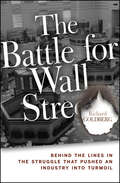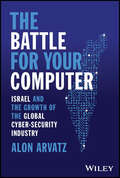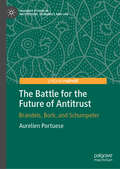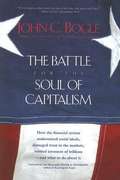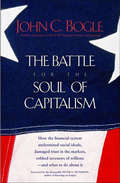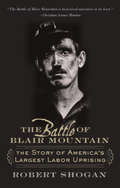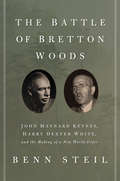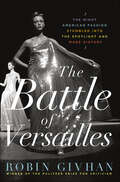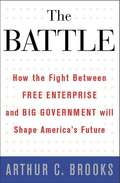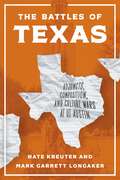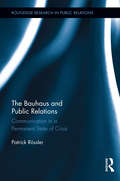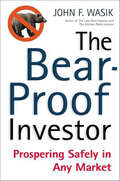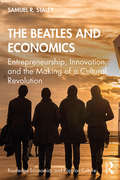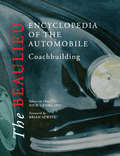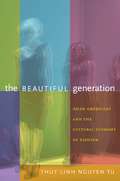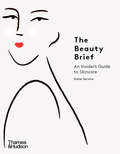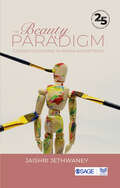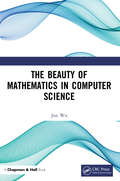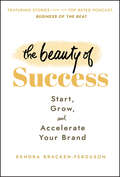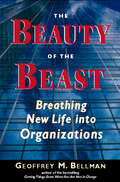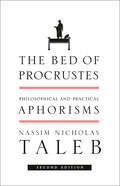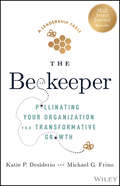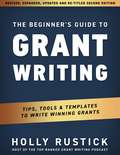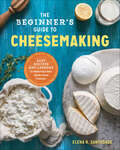- Table View
- List View
The Battle for Wall Street
by Richard GoldbergAn insider's look at the changing balance of power on Wall StreetThe Battle for Wall Street follows the struggle for power between two giants: the sellers, traditional commercial and investments banks; and the buyers, upstart hedge funds, private equity firms and the like. The battle is about winning the hearts, minds, and - yes, the wallets - of global investors. This battle is still running its course, and with the insights of industry veteran Richard Goldberg, who has had a front row seat, readers will gain a detailed understanding as to what, exactly, is going on within this dynamic arena, specifically the forces behind the shift of power from the old sell side gatekeepers to the new buy side players. The book will play out in three acts: Act One will examine the instruments of change - liquidity and financial technology - along with their influence on the sell and buy sides. Act Two will look at the agents of change - hedge funds, private equity, financial entrepreneurs, endowments, exchanges and sovereign wealth funds - and their impact on the sell and buy sides. In Act Three, Goldberg will take out his crystal ball and walk through the strategic implications for the winners and losers in this battle, against the dramatic backdrop of the subprime mortgage crisis and the resulting shakeup of global firms like Bear Stearns.But Wall Street isn't simply about institutions or corporate battles. It's a landscape dominated by personalities. Goldberg's unique access to major players will bring this book to life with amazing anecdotes and stories about the financial generals who have left their mark in The Battle for Wall Street.
The Battle for Your Computer: Israel and the Growth of the Global Cyber-Security Industry
by Alon ArvatzDiscover the extraordinary realities of the world’s most advanced cybersecurity companies and tech In The Battle for Your Computer: Israel and the Growth of the Global Cyber-Security Industry, Israeli Defense Force (IDF) cyberwarfare veteran and tech product leader Alon Arvatz examines the “why” and the “how” of the extraordinarily strong connection between Israel’s elite cyber military unit and that country’s booming offensive and defensive cybersecurity industry. In the book, you’ll explore the central role played by Israel in the global fight for cybersecurity supremacy. Featuring interviews with some of the world’s leading cybersecurity professionals and leaders, The Battle for Your Computer explains how the IDF’s “Unit 8200” became the globe’s most fruitful incubator of cyber technologies. You’ll also find: Explanations of how the technologies that protect your own computers at home and at work probably began their lives in IDF personnel or equipment The stories of the men and women working to protect Israel and how they pivoted to protecting her technology against attack Answers to fascinating questions like: How does an offensive cyber company decide to whom to sell its tech?An endlessly engrossing take on an equally engrossing subject, The Battle for Your Computer is a must-read for laypeople and cyber experts alike.
The Battle for the Future of Antitrust: Brandeis, Bork, and Schumpeter (Palgrave Studies in Institutions, Economics and Law)
by Aurelien PortueseIn an era where technology is evolving at breakneck speed and populist movements are reshaping political landscapes, the regulation of market participants stands at a critical crossroads. The future of antitrust — once a relatively stable domain of law and policy — is now caught in a fierce battle between traditional doctrines and emerging approaches that seek to address the new realities of our time. This book delves into this struggle, offering a thought-provoking exploration of how antitrust laws have evolved, how they are being challenged, and what is at stake for the future. Through a unique lens that juxtaposes the legacies of Louis Brandeis, Robert Bork, and Joseph Schumpeter, this book offers an insightful analysis of the forces shaping the future of antitrust. By tracing the historical evolution of antitrust law through economic theory and examining the ongoing debates that define today’s regulatory environment, the author provides a comprehensive yet accessible guide to the competing schools of thought in this critical field. This is a highly valuable resource for a diverse readership interested in the future of competition law and the broader regulation of innovation, from legal experts to students of law and economics, as well as professionals and policymakers navigating the complexities of market regulation.
The Battle for the Roads of Britain
by David Taylor Keith LaybournThe onset of the automobile, both cars and other vehicles, on British roads brought about a seismic change in the social, economic and political history of Britain. Cars fundamentally challenged the established democracy of the road by forcing the authorities to channel the pedestrian, and children, out of the way of the unforgiving automobile and educating them in exercising road safety. They also forced the police to implement the three Es of 'Enforcement, Engineering and Education' – enforcing the law of the road, pressing for new technology for signals and other technologies, and educating school children - in an impartial attempt to ensure that life was protected. In this process, the police should not be seen as the tools of the motorists, middle class or working class, but as the impartial enforcers of legislation, introducing as such the 'policeman-state'. Consequently, policing fundamentally changed in Britain between 1900 and 1970, as the police moved from their 'feet to their seats' in controlling traffic as British policing became more integrated and introduced new technology and modern systems.
The Battle for the Soul of Capitalism
by John C. BogleAn astute, longtime observer of the business world, the founder and former CEO of Vanguard mutual funds explains the failures of the American financial system and the abuses that have plagued it in recent years. More important, John C. Bogle offers a host of practical reforms to restore integrity to corporate and investment America and to protect small investors' interests.
The Battle for the Soul of Capitalism: How the Financial System Undermined Social Ideals, Damaged Trust in the Markets, Robbed Investors of Trillions—and What to Do About It (Playaway Adult Nonfiction Ser.)
by John C. BogleThe legendary founder of Vanguard &“presents an insider&’s view of what&’s wrong with corporate America and what can be done to improve it&” (Burton G. Malkiel, author of A Random Walk Down Wall Street).New York Times-bestselling author of Enough and The Little Book of Common Sense Investing John Bogle has seen firsthand the innermost workings—and grotesque abuses—of the financial industry, and is renowned as an advocate for the small investor and for the restoration of integrity to the system. He knows that a trustworthy business and financial complex is essential to America&’s continuing leadership in the world and to social and economic progress at home. In this book he reveals what went wrong and how we lost our way—and more importantly, how we can right our course. He argues for a return to a governance structure in which owners&’ capital that has been put at risk is used in their interests rather than in the interests of corporate and financial managers. Given that ownership is now consolidated in the hands of relatively few large mutual and pension funds, the specific reforms Bogle details in this book are essential as well as practical—and should be considered by every investor, analyst, Wall Streeter, policy maker, and businessperson. &“Deserves attention in the precincts of power.&”—Publishers Weekly
The Battle of Blair Mountain: The Story of America's Largest Labor Uprising
by Robert ShoganVeteran journalist Shogan (government, Johns Hopkins U.) tells how 10,000 coal miners in West Virginia took up arms in 1921 against the brutal mine owners, and stood off the company goons and local government forces protecting the bosses for ten days until the US government sent troops to suppress the uprising. Annotation ©2004 Book News, Inc., Portland, OR (booknews.com)
The Battle of Bretton Woods: John Maynard Keynes, Harry Dexter White, and the Making of a New World Order
by Benn SteilA sweeping history of the drama, intrigue, and rivalry behind the creation of the postwar economic orderWhen turmoil strikes world monetary and financial markets, leaders invariably call for 'a new Bretton Woods' to prevent catastrophic economic disorder and defuse political conflict. The name of the remote New Hampshire town where representatives of forty-four nations gathered in July 1944, in the midst of the century's second great war, has become shorthand for enlightened globalization. The actual story surrounding the historic Bretton Woods accords, however, is full of startling drama, intrigue, and rivalry, which are vividly brought to life in Benn Steil's epic account.Upending the conventional wisdom that Bretton Woods was the product of an amiable Anglo-American collaboration, Steil shows that it was in reality part of a much more ambitious geopolitical agenda hatched within President Franklin D. Roosevelt's Treasury and aimed at eliminating Britain as an economic and political rival. At the heart of the drama were the antipodal characters of John Maynard Keynes, the renowned and revolutionary British economist, and Harry Dexter White, the dogged, self-made American technocrat. Bringing to bear new and striking archival evidence, Steil offers the most compelling portrait yet of the complex and controversial figure of White—the architect of the dollar's privileged place in the Bretton Woods monetary system, who also, very privately, admired Soviet economic planning and engaged in clandestine communications with Soviet intelligence officials and agents over many years.A remarkably deft work of storytelling that reveals how the blueprint for the postwar economic order was actually drawn, The Battle of Bretton Woods is destined to become a classic of economic and political history.
The Battle of Versailles: The Night American Fashion Stumbled into the Spotlight and Made History
by Robin GivhanOn November 28, 1973, the world's social elite gathered at the Palace of Versailles for an international fashion show. By the time the curtain came down on the evening's spectacle, history had been made and the industry had been forever transformed. This is that story.Conceived as a fund-raiser for the restoration of King Louis XIV's palace, in the late fall of 1973, five top American designers faced off against five top French designers in an over-the-top runway extravaganza. An audience filled with celebrities and international jet-setters, including Princess Grace of Monaco, the Duchess of Windsor, Paloma Picasso, and Andy Warhol, were treated to an opulent performance featuring Liza Minnelli, Josephine Baker, and Rudolph Nureyev. What they saw would forever alter the history of fashion.The Americans at the Battle of Versailles– Oscar de la Renta, Bill Blass, Anne Klein, Halston, and Stephen Burrows – showed their work against the five French designers considered the best in the world – Yves Saint Laurent, Hubert de Givenchy, Pierre Cardin, Emanuel Ungaro, and Marc Bohan of Christian Dior. Plagued by in-fighting, outsized egos, shoestring budgets, and innumerable technical difficulties, the American contingent had little chance of meeting the European's exquisite and refined standards. But against all odds, the American energy and the domination by the fearless models (ten of whom, in a groundbreaking move, were African American) sent the audience reeling. By the end of the evening, the Americans had officially taken their place on the world's stage, prompting a major shift in the way race, gender, sexuality, and economics would be treated in fashion for decades to come. As the curtain came down on The Battle of Versailles, American fashion was born; no longer would the world look to Europe to determine the stylistic trends of the day, from here forward, American sensibility and taste would command the world's attention. Pulitzer-Prize winning fashion journalist Robin Givhan offers a lively and meticulously well-researched account of this unique event. The Battle of Versailles is a sharp, engaging cultural history; this intimate examination of a single moment shows us how the world of fashion as we know it came to be.
The Battle: How the Fight Between Free Enterprise and Big Government Will Shape America's Future
by Arthur C. BrooksBrooks, president of the American Enterprise Institute for Public Policy Research, argues that the recent economic crisis has given the small minority of people who oppose free enterprise a pretext for making sweeping changes rooted in socialism. He offers a plan of action for the defense of free enterprise and its attendant cultural values in the war against the forces of socialism. In the book's foreword, former House Speaker Newt Gingrich claims, "After you have read this book, you will be able to debate any elitist redistributionist leftist and win the day in both moral rhetoric and factual analysis. " Brooks was formerly a professor of business and government policy at Syracuse University.
The Battles of Texas: Adjuncts, Composition, and Culture Wars at UT Austin
by Mark Garrett Longaker Nate KreuterThe 1980s were a consequential decade for universities. The marketization of higher education, the adjunctification of labor, and culture wars over curriculum transformed the landscape in a short period of time. The Battles of Texas traces the lived consequences of this upheaval by focusing on one influential institution: the writing program at the University of Texas at Austin.Drawing from university records, newspaper archives, and present-day interviews, Nate Kreuter and Mark Garrett Longaker provide an on-the-ground perspective of the radical creation of UT Austin’s writing program and the subsequent events that made national headlines: the mass firing of lecturers in 1985, the national debate over “multicultural” content in the first-year curriculum, and the divorce of the writing program from the English Department in 1992. Despite these pressures, however, the authors also reveal how writing program administrators at UT Austin exerted their own agency to resist economic and political forces in service of their students and adjunct lecturers. By highlighting the parallels between the 1980s and current labor and political pressures in higher education, The Battles of Texas offers a strategic perspective for academics and administrators today. Combining a narrative institutional history with a public digital archive, searchable and arranged in exhibits and in chronological annals, The Battles of Texas provides academics with the resources they need to survive in times of rapid transition.
The Bauhaus and Public Relations: Communication in a Permanent State of Crisis (Routledge Research in Public Relations)
by Patrick RösslerThis innovative study considers one of the most important art and design movements of the 20th century, the Bauhaus, in conjunction with current research in public relations and organizational communication, elaborating on the mechanisms of internal and external communication available to influence the stakeholders in politics, society, industry, and the art world. In a movement where a substantial share of productivity ran in measures to highlight the public value of the institution funded by the taxpayer, the directors, and other persons in charge, the Bauhaus developed comprehensive strategies to communicate their messages to a variety of target groups such as politicians and economic leaders, intellectuals and other artists, current and prospective students, and the general public. To achieve this goal, the Bauhaus anticipated many instruments of modern public relations and corporate communications, including press releases, staging of events, media publications, community building, lobbying, and the creation of nationwide public presence. Rössler argues that as an organization, the Bauhaus cultivated corporate behavior and, most prominently, a corporate design which unfolded revolutionary power. The basic achievements of new typography (a label coined at the Bauhaus) determine visual communication to this day, while the Bauhaus moved from an institutional organization to a community. Beginning with an overview of the Bauhaus’ corporate identity and a close examination of the respective directors’ roles for internal and external communication, this book visits exhibitions, events, and the media attention they evoked in newspapers and contemporary periodicals, along with media products designed at the Bauhaus such as magazines, books, and bank notes.
The Bear-Proof Investor: Prospering Safely in Any Market
by John F. WasikProven strategies for keeping your money safe and your investments growing no matter which direction the market is headingAfter so many years of booming bull markets, the recent downturn has thrown a scare into millions of Americans. Novice investors are watching the news from Wall Street and wondering if they have any business being in the stock market anymore. And if not, what then?Veteran personal-finance author John F. Wasik has carved out a niche for himself dispensing time-tested, commonsense advice for the average middle-income investor and for working families-in other words, the overwhelming majority of Americans. Here, Wasik focuses on protecting, and even growing, your assets even if the market hunkers down for a long cold spell. His timely wisdom focuses on trend-proofing your portfolio, capitalizing on inescapable demographic shifts, identifying the long-term winners, value investing, dividend reinvestment, and dollar-cost averaging.For the millions of Americans who want to stop worrying about their money, The Bear-Proof Investor is a lifesaver.
The Beatles and Economics: Entrepreneurship, Innovation, and the Making of a Cultural Revolution (Routledge Economics and Popular Culture Series)
by Samuel R. StaleyThe Beatles are considered the most influential popular music act of the twentieth century, widely recognized for their influence on popular culture. The inability of other bands and artists to imitate their fame has prompted questions such as: How did the Beatles become so successful? What factors contributed to their success? Why did they break up? The Beatles and Economics: Entrepreneurship, Innovation, and the Making of a Cultural Revolution answers these questions using the lens of economic analysis. Economics provides the prism for explaining why their success—while legendary in scale—is not mythic. This book explores how the band’s commercial achievements were intimately tied to the larger context of economic globalization and rebuilding post-World War II. It examines how the Beatles’ time in Hamburg is best understood as an investment in human capital, and why the entrepreneurial growth mindset was critical to establishing a scalable market niche and sustaining the Beatles’ ability to lead and shape emerging markets in entertainment and popular music. Later chapters consider how the economics of decision making and organizational theory helps us to understand the band’s break-up at its economic peak. This essential text is of interest to anyone interested in the economic dynamics and social forces that shape cultural change.
The Beaulieu Encyclopedia of the Automobile: Coachbuilding
by Nick GeorganoThis volume explores the art of coachbuilding from its roots in the late nineteenth century through to the inevitable decline that set in during the 1950's. This definitive work explores both the great names and the forgotten innovators of the industry with the detailed entries and generous illustrations that have won the Encyclopedia of the Automobile critical raves and legions of fans on both sides of the Atlantic.
The Beautiful Generation: Asian Americans and the Cultural Economy of Fashion
by Thuy Linh Nguyen TuSince the 1990s, young Asian Americans including Doo-Ri Chung, Derek Lam, Thakoon Panichgul, Alexander Wang, and Jason Wu have emerged as leading fashion designers. They have won prestigious awards, been chosen to head major clothing labels, and had their designs featured in Vogue, Harper's Bazaar, and other fashion magazines. At the same time that these designers were rising to prominence, the fashion world was embracing Asian chic. During the 1990s, "Asian" shapes, fabrics, iconography, and colors filled couture runways and mass-market clothing racks. In The Beautiful Generation, Thuy Linh Nguyen Tu explores the role of Asian American designers in New York's fashion industry, paying particular attention to how they relate to the garment workers who produce their goods and to Asianness as a fashionable commodity. She draws on conversations with design students, fashion curators, and fashion publicists; interviews with nearly thirty Asian American designers who have their own labels; and time spent with those designers in their shops and studios, on their factory visits, and at their fashion shows. The Beautiful Generation links the rise of Asian American designers to historical patterns of immigration, racial formation, and globalized labor, and to familial and family-like connections between designers and garment workers.
The Beauty Brief: An Insider's Guide To Skincare
by Katie ServiceStylish and practical, this beauty expert’s guide to making informed skincare choices is a must-have for all beauty enthusiasts looking for safe, effective, and sustainably sourced products. Valued at over $550 billion, the global cosmetics market is experiencing an unprecedented boom worldwide, driven by the powerful influence of Instagram and YouTube’s new stars and renewed scrutiny when it comes to healthy and eco-friendly ingredients. With so many new products and procedures on the market, this timely guide by beauty expert Katie Service is designed to help readers choose the best products for their daily skincare. Opening with an accessible introduction that breaks down the big issues facing the beauty industry—from recyclables and vegan or cruelty-free products to “dupes” and toxic ingredients—Service goes on to reveal firsthand insider knowledge that every beauty enthusiast should know. Thematic chapters explore topics ranging from key ingredients, on-the-go products, morning and evening regimes, emergency skincare tips, and dermatological treatments, featuring case studies of global best-sellers Weleda Skin Food to Glossier Solution. Featuring specially commissioned illustrations, The Beauty Brief is a must-have reference for beauty enthusiasts, revealing which ingredients, products, and procedures to adopt or avoid for each skin type, age bracket, gender, and budget.
The Beauty Paradigm: Gender Discourse in Indian Advertising
by Jaishri JethwaneyFair skin sells the cream Trendy women sell the scooter Dashing men sell the car Seductive gestures can sell almost anything If media only mirrors reality, is advertising then guilty of misogyny, voyeurism and objectification of women? In an attempt to look at Indian ads across various brand categories with a gender lens based on societal and sociological perspectives, The Beauty Paradigm: Gender Discourse in Indian Advertising deconstructs the quintessential Indian woman that the advertising industry depicts across the spectrum. Drawing insights from a seminal research study and Erving Goffman’s classic book ‘Gender Advertisements’, this book traces the journey of a few decades to map trends and patterns in Indian advertising and presents the perspectives of the creative teams and top managements across Indian and global agencies.
The Beauty of Mathematics in Computer Science
by Jun WuThe Beauty of Mathematics in Computer Science explains the mathematical fundamentals of information technology products and services we use every day, from Google Web Search to GPS Navigation, and from speech recognition to CDMA mobile services. The book was published in Chinese in 2011 and has sold more than 600,000 copies. Readers were surprised to find that many daily-used IT technologies were so tightly tied to mathematical principles. For example, the automatic classification of news articles uses the cosine law taught in high school. The book covers many topics related to computer applications and applied mathematics including: Natural language processing Speech recognition and machine translation Statistical language modeling Quantitive measurement of information Graph theory and web crawler Pagerank for web search Matrix operation and document classification Mathematical background of big data Neural networks and Google’s deep learning Jun Wu was a staff research scientist in Google who invented Google’s Chinese, Japanese, and Korean Web Search Algorithms and was responsible for many Google machine learning projects. He wrote official blogs introducing Google technologies behind its products in very simple languages for Chinese Internet users from 2006-2010. The blogs had more than 2 million followers. Wu received PhD in computer science from Johns Hopkins University and has been working on speech recognition and natural language processing for more than 20 years. He was one of the earliest engineers of Google, managed many products of the company, and was awarded 19 US patents during his 10-year tenure there. Wu became a full-time VC investor and co-founded Amino Capital in Palo Alto in 2014 and is the author of eight books.
The Beauty of Success: Start, Grow, and Accelerate Your Brand
by Kendra Bracken-FergusonTap into your authentic self in work and life, unlock your career potential and embrace your freedom to choose If you have ever thought about becoming an entrepreneur—or if you are an “intrapreneur” climbing the corporate ladder—this book is for you. The Beauty of Success is an ultra-modern blueprint for navigating the path to starting, growing and accelerating your career while sowing the seeds of self-awareness and self-reflection. You’ll discover how author and 3x founder, Kendra Bracken-Ferguson aligned her personal pillars of community, mentorship, education, and capital with her business goals to bring her vision for building a successful company to fruition. Through her story, and the stories of other entrepreneurs in the beauty industry, she shares helpful nuggets of wisdom and collective experience that will help you pursue an entrepreneurial career or follow your path to the top of your corporate sector. The Beauty of Success is your guide to discovering your own guiding pillars, finding what ignites your passion, recognizing your strengths, and safeguarding what makes you valuable. Find inspiration in the story of Kendra Bracken-Ferguson’s entrepreneurial success and the candid stories of other prominent visionaries and leaders Identify the values and pillars that guide your life and your career, and find ways to align with them every day Reconnect with your inner purpose and your passion, whether you are starting your own business or climbing to the top of the corporate world Transcend any barriers to open yourself to new paths and levels of success The Beauty of Success will help you find your own professional north star—the principle or principles that will serve as your compass as you navigate your professional journey. You will also learn to appreciate the strengths that have gotten you this far, and how to leverage them to get where you want to be. Unlock your own success, find freedom, and carpe diem!.
The Beauty of the Beast: Breathing New Life Into Organizations
by Geoffrey M BellmanTHE WAYS WE GO about changing organizations usually don't work, asserts Geoff Bellman. Our underlying assumptions predetermine the results and preclude the broad success we so desperately seek. Change efforts often end up off-track because of small expectations. What is needed are grand expectations, so big that they cannot be realized in many lifetimes. It is only when people awaken to and work toward these immense purposes that they have the chance of finding fulfillment. Organizations are the perfect place to do this-these "beasts" which we create and curse, love and hate, that are so essential to our lives. In The Beauty of the Beast, Bellman shows how we can explore our huge potential and shift our daily organizational focus to one of long life and fulfillment-and in the process redesign our organizations for tomorrow. Bellman examines why we keep creating these creatures that fall so far short of our dreams for them. He reveals how to recognize the beast in ourselves, showing how organizational control and hierarchy multiply our natural and less constructive inclinations many times over. He points out that the problem is not the existence of organizations but in the ways we imagine them. Bellman asks us to consider what we want to pass on to future generations, helps us imagine the organizations we would be proud to create, and challenges us to take action from where we are today. He offers twenty renewal assertions to help us in redesigning organizations for tomorrow. These solid guides (with related questions for work groups) open the organization to new possibilities, helping us to embrace the organizational world as it really is while working hard to change it. In the process we will also change ourselves, as we ultimately feel less distant from-and more responsible for-creating those troubling structures we love to vent about. The Beauty of the Beast. will help people see their daily work in a new and larger perspective. It will help them embrace the real organizational world while they work at renewing it. And it will help people to recognize the choices available to them-and to exercise those choices for positive results.
The Bed of Procrustes: Philosophical and Practical Aphorisms (Incerto #4)
by Nassim Nicholas TalebBy the author of the modern classicThe Black Swan, this collection of aphorisms and meditations expresses his major ideas in ways you least expect. The Bed of Procrustestakes its title from Greek mythology: the story of a man who made his visitors fit his bed to perfection by either stretching them or cutting their limbs. It represents Taleb's view of modern civilization's hubristic side effects-modifying humans to satisfy technology, blaming reality for not fitting economic models, inventing diseases to sell drugs, defining intelligence as what can be tested in a classroom, and convincing people that employment is not slavery. Playful and irreverent, these aphorisms will surprise you by exposing self-delusions you have been living with but never recognized. With a rare combination of pointed wit and potent wisdom, Taleb plows through human illusions, contrasting the classical values of courage, elegance, and erudition against the modern diseases of nerdiness, philistinism, and phoniness.
The Beekeeper: Pollinating Your Organization for Transformative Growth
by Michael G. Frino Katie P. DesiderioPut yourself at the center of your team’s learning and growth In The Beekeeper, a team of renowned management and leadership professionals deliver an insightful and engaging exploration of what it means to place oneself at the core of learning and growth for the members of your organization. The story is told through the eyes of Catherine, the 43-year-old founder and owner of a rapidly growing business. You’ll follow her as she transforms the way she leads and inspires others, revolutionizing the culture at her company by learning from the people around her. The authors lead you through practical strategies and techniques you can implement immediately to achieve extraordinary results in your life and in your business. You’ll learn about: Taking a central and active role in the growth and maturation of your employees and leadership team members The author’s “Art of Learning to Be Proximal,” a strategy for placing yourself at the core of your company’s growth Methods for ensuring your team is putting people first and living your company’s mission and values An indispensable guide for founders, entrepreneurs, managers, and executives at growing companies, The Beekeeper will also earn a place on the bookshelves of company board members looking for ways to best contribute to their firm’s ongoing success.
The Beginner's Guide To Grant Writing: Tips, Tools, And Templates To Write Winning Grants
by Holly RustickThe Beginner's Guide to Grant Writing: Tips, Tools, & Templates to Write Winning Grants is your savior. It’s a proven step-by-step system to help you write competitive grants. Holly Rustick has secured millions and millions of dollars for organizations worldwide, and in this workbook, she shares her proven G.R.A.N.T.S. formula with you.
The Beginner's Guide to Cheesemaking: Easy Recipes and Lessons to Make Your Own Handcrafted Cheeses
by Elena R. SantogadeBeginners Become Experts—Cheese Making Made EasyThe Beginner's Guide to Cheese Making is an ideal introduction to making cheese at home. Filled with simple advice and straightforward recipes, this book makes it easy for you to start crafting your own scrumptious cheeses. No experience needed.Want to customize your cheeses? Discover the best ways to experiment with recipes and change up your creations. You'll also find suggestions for the best beer and wine pairings.The Beginner's Guide to Cheese Making includes:Complete Instructions—You'll know exactly what to do every step of the way thanks to thorough, illustrated guides geared towards new cheese makers.Step-by-Step Tracking—Write down your cheese making process on record sheets so you can easily remember or alter recipes on future attempts.Cheese is Only the Beginning—Learn how your homemade cheese can become the essential ingredient in savory snack, meal, and dessert recipes.Become the cheese master (who never has to settle for store-bought) with The Beginner's Guide to Cheese Making.
